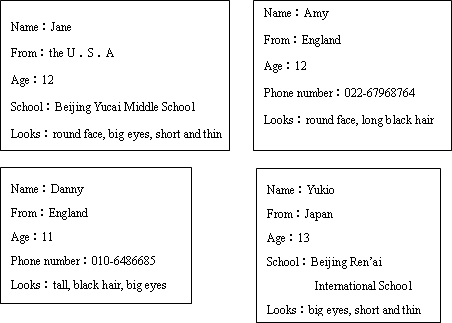题目内容
All living things need air. Living things cannot live without air. We can go without food or water for
a few days, but we can't live a few minutes without air. We take in air. When we are working, we need
more air. When we are sleeping, we need less air.
We live in air but we cannot see it. We can only feel it. We can feel it when it is moving. Moving air
is called wind. How can you make air move? Here is one way. Take an open book in your hands in front
of your face. Close it quickly. What can you feel? It is air.
A. It's on the table.
B. It's around us everywhere.
C. It's near us.
D. It's not here.
B. rain
C. snow
D. cloud
B. Sitting.
C. Working.
D. Standing.

 课堂练加测系列答案
课堂练加测系列答案 轻松课堂单元测试AB卷系列答案
轻松课堂单元测试AB卷系列答案
| |||||||||||||||||||||||||||||||||||||||||||||
| |||||||||||||||||||||||||||||||||||||||||||||||||||||||||||||||||||||||||
| |||||||||||||||||||||||||||||||||||||||||||||||||||||||||||||||
| |||||||||||||||||||||||
| 阅读理解. | ||||||||||||||||||||||
|
Ai Fukuhara (福原爱),the Japanese table tennis star, was born on Nov.11, 1988. She started playing
| ||||||||||||||||||||||

